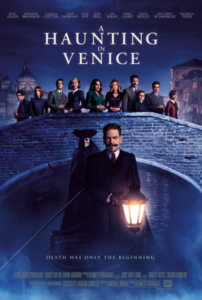
Review
Legendary moustachioed Belgian sleuth Hercule Poirot, played by Branagh, is back for the third time. This time Branagh adapts Christie’s late novel Hallowe’en Party, moving the setting to a crepuscular Venice.
The timeline follows on from the previous Poirot case, Death on the Nile; the year is 1947, and Hercule Poirot is in genial retirement in Venice … his friend, the bestselling American mystery author Ariadne Oliver (Tina Fey) is in town. She impishly persuades him to come with her to a Halloween séance being conducted at a nearby palazzo by the famous psychic Mrs Reynolds (Michelle Yeoh) – with a view, of course, to debunking her. Horrible events ensue. Could sinister ghostly forces be at work? Well, Poirot takes a refreshingly atheist view and, like the Scooby-Doo gang, believes that supernatural phenomena and non-rational explanations are a diversionary tactic promoted by those with something to hide. (https://www.theguardian.com/film/2023/sep/10/a-haunting-in-venice-review-branaghs-agatha-christie-whodunnit-given-horror-makeover)
Christie’s and Branagh’s Poirot is a hyperrational character and, consequently, an atheist: his strict logic comes from his famous ‘little grey cells’ that allow him to solve every mystery in a linear way with a logical explanation. In this case, instead, the unhappy retired Poirot enters an irrational, supernatural, quasi-horror world that makes him doubt his belief in logic and his persona altogether. This is the novelty in the movie. The search for an analytical solution becomes a challenge to himself, even if we know ‘by statute’ that in the end the detective will find the murderer, reveal the motive and the developments of the facts addressing, as the climax imposes, the six suspected characters locked for the whole night in the haunted palace.
Venice in fall is dark, rainy, stormy, thrilling, the perfect objective correlative of the plot. Its murky, swirling waters hint at dark secrets that accumulate over centuries. The palazzo, creepy, claustrophobic and with sepulchral interior, is cut off from the police launches by stormy weather, much like the snowed-in country houses of old.
Alas, the final solution comes all of a sudden, when Poirot recovers from his dreamlike state he cannot understand or accept, too quickly and out of the blue, and with no chance for the spectator to even vaguely guess it.
Poirot’s voyage into a new irrational world is also an epiphany that shows him he is not pleased in his golden loneliness, a pensioner with no case to challenge him and no reason to carry on. This revelation takes him back to work, the little grey cells in motion again, and probably ready for a next episode on screen.
Branagh is superb as usual, creating a fascinating old-fashion character, out of time and out of his own personal time. The more so, the more appealing, in his impenetrable loneliness and toughness. But do not forget that the director offered us a glimpse of Piorot’s soul in his previous Death on the Nile, which explains the external protecting shield the character has built in time… in this study in character the inner humanity of the detective breaks through his notorious aplomb, and we see him fight to control his emotions and pulsions (see my review Death on the Nile – a detective with a soul).